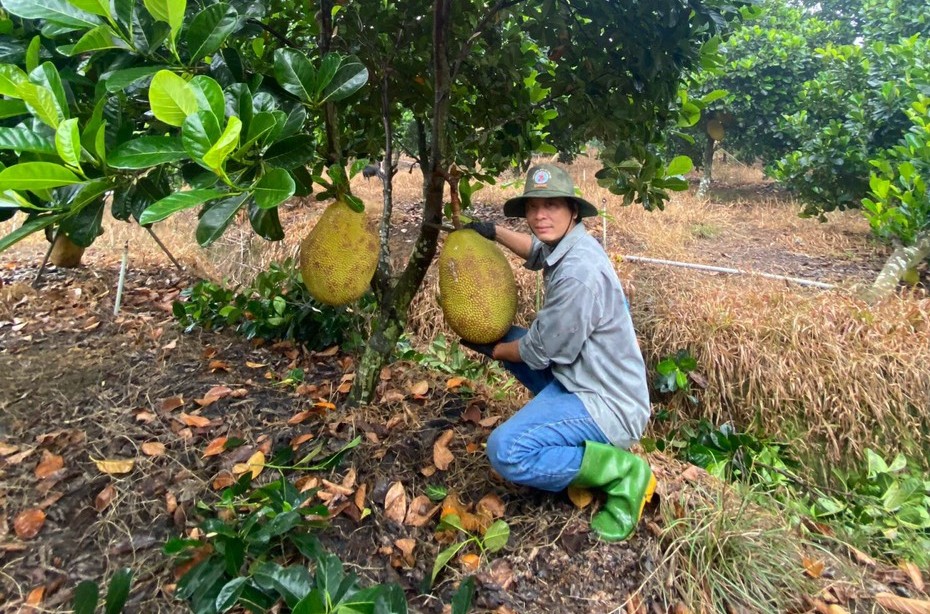Strengthen control of environmental pollution in rural areas
Agricultural production using machinery, fertilizers, pesticides, and increasing investment in industrial zones and clusters in rural areas have significantly affected air quality. To control and prevent negative environmental developments, localities have actively applied measures and raised people's awareness of environmental protection.

Production of red-fleshed jackfruit according to VietGAP standards at Vu Tang Binh Duong farm (Dat Cuoc commune, Bac Tan Uyen district)
Change the habit
As a purely-agriculture-based commune, most people in Lac An commune (Bac Tan Uyen district) have taken appropriate measures to ensure agricultural production activities associated with environmental protection. Nguyen Thai My, Chairman of Lac An Commune People's Committee, said: “Currently, straw will be provided by people or purchasers to establishments growing perennial crops or mushrooms. For vegetable packaging, the commune arranged 12 garbage pits to store it, then periodically the collection unit takes it away for treatment.
Also according to My, currently the commune has a few people still burning trash, and the commune organized dialogues with these people; asked mass organizations to persuade people to register to collect trash. People understand that burning trash will affect the air environment and their health, so they have their waste collected.
Also a agriculture-based commune, Hieu Liem has the largest citrus fruit growing area in Bac Tan Uyen district and the whole province. To strengthen control of air pollution from agricultural production activities, the commune coordinates with state agencies to implement specific solutions.
According to Mai Duc Quy, People's Committee’s Chairman of Hieu Liem commune, the commune currently has 2 storehouses and 26 collection points of pesticide bottles located in 3/3 hamlets to serve households and small-scale farms. The People's Committee contracts with households to collect empty bottles and jars of plant protection chemicals at collection points to large warehouses on a monthly basis. At the end of each quarter, Natural Resources and Environment Office will collect and transport hazardous waste to Loc Troi Group's incinerator to burn in a specialized furnace. Hazardous solid waste in the area is collected, transported and treated to meet environmental protection requirements.
Environmentally friendly production
Agricultural production in forms such as ecological farms, high-tech agriculture, urban agriculture, tourism... is one of the solutions to protect the environment in general. Farms focus on production meeting organic standards, VietGAP and GlobalGAP processes for crops such as oranges, jackfruit, and all kinds of vegetables. This production process is to ensure safety for producers and consumers and not harm the environment.
Typical production units following organic standards are Vinamit Company (Ben Cat town), Nam Hang and Nhan Duc Cooperative (Bac Tan Uyen district)... In addition, some environmentally friendly agricultural production models, products recognized by the Provincial People's Committee with three-star OCOP in 2023 are clean and safe vegetable production of the net house vegetable cooperative group (Tru Van Tho commune, Bau Bang district); Vu Tang Binh Duong red-fleshed jackfruit farm (Dat Cuoc commune, Bac Tan Uyen district)... Recycling and reusing raw materials from agricultural production activities are also utilized by establishments to develop environmentally friendly products such as fuel, essential oils, soap...
For industrial zones and clusters in rural areas, they must ensure adequate technical infrastructure for environmental protection, wastewater treatment systems, exhaust gas... Companies operating in industrial zones and clusters must raise awareness of compliance with laws on environmental protection.
Regarding the livestock industry, the province has been converting small-scale, dispersed livestock farming methods to farm-scale livestock breeding associated with environmental protection, biosecurity and high technology application. Currently, livestock farms are mainly concentrated in 4 northern districts (Bau Bang, Phu Giao, Dau Tieng and Bac Tan Uyen).
According to Mai Duc Quy, livestock and poultry barns in Hieu Liem commune are guaranteed to be separated from houses, water sources, and residential areas, at least 100m from surface water sources, and over 1km from water plants. Livestock waste is collected and treated through a wastewater treatment system (via Biogas or VAC system) that meets national technical environmental standards in accordance with the law, and is not allowed to overflow into the surrounding area and not produce unpleasant odors.
In order to strengthen control of environmental pollution and cope with climate change, the province focuses on implementing and replicating cultivation and livestock models, arranging appropriate crop and livestock structures; protect, conserve, and restore biodiversity and natural ecosystems, increase community participation in the conservation of biodiversity and natural ecosystems; promote the production and use of organic fertilizers and methane gas recovery. At the same time, guide the application of preferential policy mechanisms and support for waste treatment activities, landscape construction, rural environmental protection and waste management activities according to law.
Reported by T.Hanh, Q.Khanh - Translated by Ngoc Huynh

